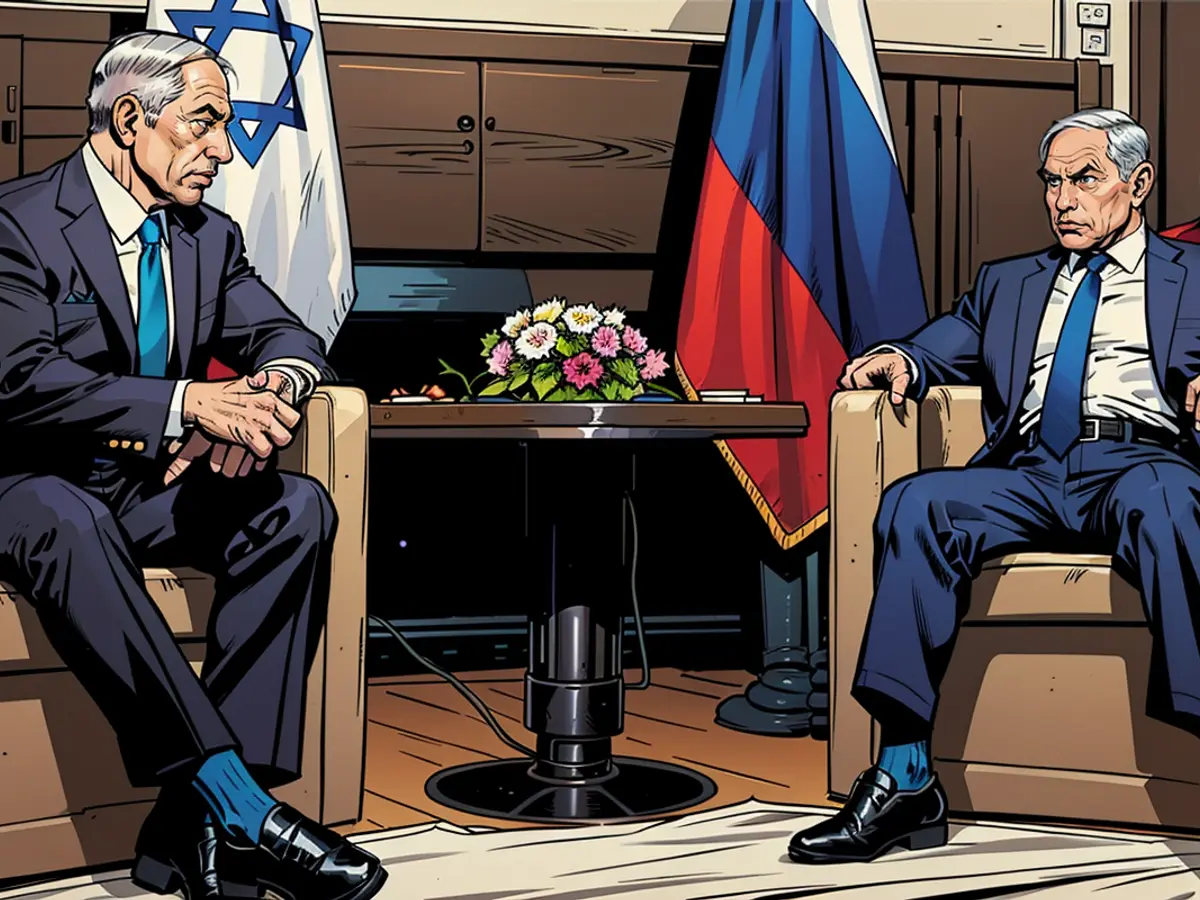Israel is implementing strategies that Putin apprehensively anticipates.
For several weeks, Israel has been aggressively targeting Hamas and Hezbollah terrorists. Several fighters, high-ranking commanders, and leaders from both groups have been eliminated, seemingly incapacitating them within a short period. This development has sparked concerns among Russian nationalists.
At first glance, the conflicts in Ukraine and the Middle East seem unconnected. However, Russian nationalists have a different perspective. They're keeping a close eye on Israel's operations against Hamas in Gaza and now against Hezbollah in Lebanon. They're worried that Russian vulnerabilities may be exposed if Israel's tactics are used against them. The Center for European Policy Analysis (CEPA) points this out in a recent analysis, stating that Moscow is closely monitoring events in Lebanon.
Some Russian propaganda outlets have drawn parallels between the now considerably weakened Hezbollah and Russia. They're urging caution, warning the Kremlin not to underestimate the situation. If Russia doesn't learn from what's happening in Lebanon, its leadership structure could be dismantled like Hezbollah's.
One leading Russian nationalist, Aleksandr Dugin, reacted to the death of Hassan Nasrallah with intense words. He viewed the Israeli strike against the long-standing Hezbollah leader as the "start of the end of the world" and a "massive blow to the entire structure of Middle Eastern resistance."
Dugin and other radicals seem to view Israel's successful military operations against terrorists like Nasrallah as a dangerous template for their own regime. They're advocating for preemptive strikes against Russia's adversaries. Kremlin-linked military analysts also endorse this approach, as shown in texts on the Military Review platform. For instance, far-right Duma deputy Jevgeni Fjodorov stated that Israel's actions in Lebanon raise questions about Russian security.
Israel: Russia Supplies Weapons to Hezbollah
Despite not being an official ally of terrorists in the Middle East, Russia maintains an alliance with radical anti-Israel forces in the region, as per the mantra "The enemy of my enemy is my friend."
Israel's Prime Minister Benjamin Netanyahu accused Russia of supporting Hezbollah with advanced weapons. During operations in Lebanon, the Israeli army discovered "highly advanced Russian weapons," Netanyahu claimed to the French newspaper "Le Figaro" last week.
"Russia has shown solidarity with the outcasts of the world," CEPA analyst Kseniya Kirillova summarized. This aligns with Russia's unofficial alliance with Iran, the biggest supporter of Hezbollah. According to Kremlin-linked military analysts from Military Review, both Russia and Iran are being pushed towards extremes by the West. Russia is allegedly being pushed towards nuclear weapons, and Iran towards a full-scale war with Israel.
Both countries are urged to find an "unexpected and non-trivial solution," the nationalists argue. They provide specific proposals, including massive rocket attacks on Ukrainian government buildings, false flag attacks on NATO countries, drone attacks on American facilities, satellite attacks, rocket attacks on Romanian stations, ammunition depot raids in the Baltics, and sinking of British ships, all under a pretext that Russia has no involvement.
Rising Antisemitism in Russia
These outlandish proposals are intertwined with strong antisemitism. Conspiracy theories about Jews starting the war in Ukraine to expel Slavs and settle the land themselves have gained traction among Russian nationalists. Such unfounded narratives may have contributed to the antisemitic riots in Dagestan last year.
Initially, Russian President Vladimir Putin and Israeli Prime Minister Benjamin Netanyahu had a good relationship. Post-Putin's office, Israel and Russia grew closer. In 2012, Putin opened a Jewish museum in Moscow. In 2016, he urged European Jews to migrate to Russia in response to antisemitism in Europe.
However, the relationship between the two nations changed after Kremlin troops entered Ukraine. Although Israel rejected sanctions against Russia and did not supply weapons to Ukraine, the situation has significantly deteriorated. Russia's anti-Israel stance became particularly evident after the Hamas terror attack on October 7, 2020. Putin didn't express condolences to Israel's prime minister until ten days later, not mentioning a terrorist attack. In the following months, Putin distanced himself from Israel and aligned with her adversaries. Putin blamed the West, not the terrorists, for the conflict in Gaza.
Perhaps, Israel is now offering a roadmap for Putin's opponents on how to defeat him.
The Center for European Policy Analysis (CEPA) noted that Moscow is closely monitoring the situation in Lebanon, as Russian nationalists have expressed concerns about potential vulnerabilities if Israel's tactics are applied against them. In light of Israel's successful military operations against Hezbollah, some Russian leaders, such as Aleksandr Dugin, have viewed these as a dangerous template for their own regime, advocating for preemptive strikes against their adversaries.








